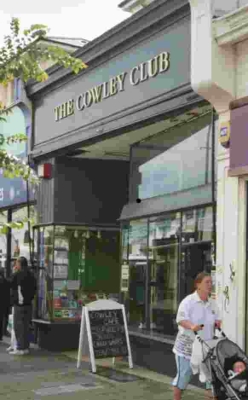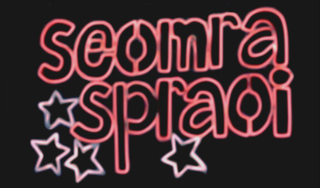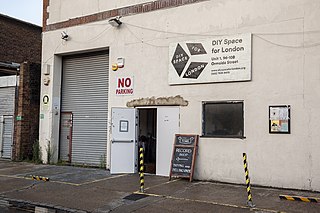Related Research Articles
Last Hours is an anti-authoritarian publishing collective. From 2003 to 2008 it produced a fanzine, initially called Rancid News until issue 9, changing its name to Last Hours from issue 10 till the final issue, 17, in May 2008. All 17 issues were edited by Edd Baldry before he stood down as editor. Since 2008 Last Hours has become a publishing collective, launching a website, and releasing two books in the autumn of 2009, Excessive Force and Diary of a miscreant.

ABC No Rio is a collectively-run non-profit arts organization on New York City's Lower East Side. It was founded in 1980 in a squat at 156 Rivington Street, following the eviction of the 1979-80 Real Estate Show. The centre featured an art gallery space, a zine library, a darkroom, a silkscreening studio, and public computer lab. In addition, it played host to a number of radical projects including weekly hardcore punk matinees and the city Food Not Bombs collective.
A guerrilla gig is a type of concert performed in a non-traditional setting or arranged in an unusual fashion. It became associated with punk rock, and noise rock bands in UK and the United States during the early to mid-2000s. Bands who perform at such events are sometimes referred to as "guerrilla rockers".
Toxic Waste was an anarcho-punk band from Belfast, Northern Ireland.
rampART was a squatted social centre in the Whitechapel area of east London. It was established in a derelict building in Rampart Street which was previously used as an Islamic school for girls. The centre operated as a private members club providing a space for a wide range of groups to carry out their activities. It was managed by volunteers without any funding and with a strong emphasis on consensus decision making and DIY culture.
Wapping Autonomy Centre was a self-managed social centre in the London Docklands from late 1981 to 1982. The project was initially funded by money raised by the benefit single Persons Unknown/Bloody Revolutions, as well as benefit gigs by Crass and The Poison Girls.

The Lemp Neighborhood Arts Center (LNAC), also known as "The Lemp," is a non-profit performance space, art gallery, and community center located in the historic Benton Park neighborhood of St. Louis, Missouri. Since its founding in March 1994, the organization has been among the forefront of art spaces committed to the DIY ethic in St. Louis and the Midwest, holding the position as one of the oldest all-ages "Do-It-Yourself" music venues in the region and in the United States, alongside ABC No Rio in New York City, 924 Gilman Street in Berkeley, California, and the Ché Café in La Jolla, California.

Self-managed social centres in the United Kingdom can be found in squatted, rented, mortgaged and fully owned buildings. These self-managed social centres differ from community centres in that they are self-organised under anti-authoritarian principles and volunteer-run, without any assistance from the state. The largest number have occurred in London from the 1980s onwards, although projects exist in most cities across the UK, linked in a network. Squatted social centres tend to be quickly evicted and therefore some projects deliberately choose a short-term existence, such as A-Spire in Leeds or the Okasional Café in Manchester. Longer term social centres include the 1 in 12 Club in Bradford, the Cowley Club in Brighton and the Sumac Centre in Nottingham, which are co-operatively owned.
War zone or warzone may refer to a zone of war, or to:

The Cowley Club is a libertarian self-managed social centre in Brighton, England. It opened in 2003, providing resources and meeting spaces for groups and individuals active in areas such as workplace and unemployed struggles, international solidarity, animal liberation, ecological defence, feminist and queer activism and opposing the arms trade. Its political identity is close to anarchism or libertarian socialism. It also houses a vegan community café, a bookshop, and free English lessons for migrants.

Seomra Spraoi was a self-managed social centre in Dublin, Ireland which first opened in 2004 and closed in 2015. It was run on a not-for-profit basis by an anti-capitalist collective with anarchist principles.

The 1 in 12 Club refers to both a members' club and the building in which it is based, in Bradford, West Yorkshire, England. Owned and run by its membership as a collective based upon anarchist principles, its activities include social and political campaigning—most visibly as a hub for the city's May Day activities—and use of the building as a self-managed social centre and host for performing arts. In the 1980s it was one of the main locations for the UK crust and anarcho-punk scene, and in the 1990s played host to much of the country's straight edge metalcore scene.

Self-managed social centres in Italy exist in many cities. They are part of different left-wing political networks including anarchist, communist, socialist, and autonomist. The centres tend to be squatted and provide self-organised, self-financing spaces for alternative and noncommercial activities such as concerts, exhibitions, farmers' markets, infoshops, and migrant initiatives. Over time, some but not all projects have opted to legalize their status.
Oh Yeah is a music centre located in Belfast, Northern Ireland, in the Cathedral Quarter. It was founded primarily to support young talented musicians and bands from Northern Ireland and its huge and growing music scene by providing help and promotion, technical equipment for rehearsing, recording, gigs and event organisation, performing space and releases of band compilations. The Oh Yeah Music Centre's genres are varying in its manifolds of Alternative rock, Indie rock, Electronica, Post rock, Post punk, Crossover, Experimental rock and further musical stylistic ways and conceptions.
The Mr. Roboto Project is an all-ages, Do It Yourself (DIY), nonprofit volunteer-run cooperative venue and show space in Pittsburgh, Pennsylvania. Since the fall of 2011, it has been located at 5106 Penn Avenue. The structure of The Mr. Roboto Project was modeled partially after the 924 Gilman St club in Berkeley, CA, combined with elements of the East End Food Co-op in Pittsburgh, PA.
Roll Up Your Sleeves is an Irish documentary about do-it-yourself counterculture directed by Dylan Haskins. It also examines the relationship between DIY culture and the need for autonomous social spaces, looking at various projects across Europe and how these compare with the situation in Ireland.
The Harp Bar was a public house and live music venue based in Hill Street, central Belfast, Northern Ireland. It's notable in the context of punk rock history, particularly music from Northern Ireland. It was owned between 1977 and 1984 by Patrick (Patsy) Lennon who some years later built and owned the Limelight nightclub and Dome Bar.
The Autonomous Centre of Edinburgh, also known as ACE, is an infoshop and autonomous social centre in Edinburgh, Scotland. It was founded in 1997, although it follows on from previous groups.

DIY Space for London was a volunteer-run social centre, music venue, rehearsal space, and creative hub formerly located at 96-108 Ormside Street in South Bermondsey, London.
References
- 1 2 Canon, Gabrielle (9 July 2013). "Warzone Collective: The Alternative Approach to Breaking Down Boundaries in Belfast". Huffington Post. Archived from the original on 23 September 2020. Retrieved 25 May 2019.
- ↑ Heron, Timothy (2015). "'Alternative Ulster': punk and the construction of everyday life in 1970s Northern Ireland". Popular Culture Today: Imaginaires 19.
- 1 2 González, A. G. (2016). "Out of the Box: Punk and the concept of 'Community' in Ireland". Liverpool Postgraduate Journal of Irish Studies. 1 (1): 39–52. Retrieved 25 May 2019.
- 1 2 "Belfast Punk. Warzone Centre 1997–2003". Damiani. Archived from the original on 25 May 2019. Retrieved 25 May 2019.
- 1 2 Whitehouse, Matthew (23 February 2017). "Inside the Warzone: photographing Belfast's 90s punk scene". Vice. Archived from the original on 25 May 2019. Retrieved 25 May 2019.
- ↑ "Out of step: the 90s punks of Belfast – in pictures". Guardian. 22 February 2017. Archived from the original on 25 May 2019. Retrieved 25 May 2019.
- ↑ Belinky, Beju (4 July 2017). "The DIY space that brought hope to Belfast's 90s youth". Huck Magazine. Archived from the original on 25 May 2019. Retrieved 25 May 2019.
- ↑ "The Future Was (AND IS) Punk – The Warzone Dialectogram Exhibition". Queen's University Belfast. The Senator George J. Mitchell Institute for Global Peace, Security and Justice. Archived from the original on 27 May 2019. Retrieved 27 May 2019.